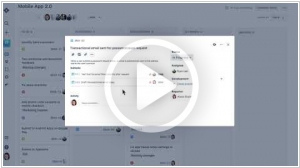GitHub vs JIRA
May 18, 2023 | Author: Michael Stromann
73
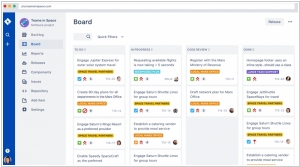
JIRA provides issue tracking and project tracking for software development teams to improve code quality and the speed of development. Combining a clean, fast interface for capturing and organising issues with customisable workflows, OpenSocial dashboards and a pluggable integration framework, JIRA is the perfect fit at the centre of your development team.
GitHub and JIRA are both widely used tools in software development, but they serve different purposes and cater to different aspects of the development process. GitHub is primarily a version control and code collaboration platform. It allows developers to host and manage their source code repositories, track changes, collaborate on code with pull requests, and manage issues and bug tracking. GitHub provides an interface for developers to work on projects collaboratively, with features like code reviews, branching, and merging. On the other hand, JIRA is a comprehensive project management tool that focuses on issue tracking, task management, and agile project management. It offers features like issue creation, assignment, progress tracking, workflow management, and agile boards for project planning and execution. JIRA provides a centralized platform for teams to manage and track their projects, including bug tracking, feature requests, and user stories.
See also: Top 10 Source Code Management tools
See also: Top 10 Source Code Management tools
GitHub vs JIRA in our news:
2023. Atlassian brings an AI assistant to Jira and Confluence
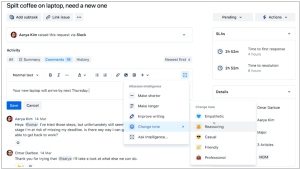
Atlassian has introduced Atlassian Intelligence, an AI-powered 'virtual teammate' that utilizes the company's proprietary models and OpenAI's large language models to create customized teamwork graphs. This technology enables various functionalities, such as AI-generated summaries in Confluence and test plans in Jira Software, as well as the rewriting of responses to customers in Jira Service Management. Atlassian Intelligence provides users with a chatbox similar to Chat-GPT, which is deeply integrated into different products and allows for the referencing of specific documents. For instance, to generate a summary of action items from a recent meeting, users can link the document with the transcript and request the summary inside Confluence. The tool then generates a list of decisions and action items from the meeting.
2022. Atlassian acquires Percept.AI
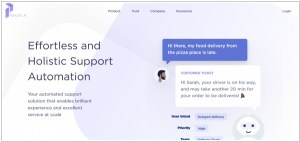
Atlassian has recently completed the acquisition of Percept.AI, an artificial intelligence (AI) company known for its automated virtual agent support solution—a chatbot that utilizes a proprietary AI engine for natural language understanding. The intention behind this acquisition is to integrate the advanced virtual agent technology into Jira Service Management, Atlassian's IT service management tool aimed at improving service delivery for both employees and customers. Percept.AI's platform, driven by data-driven proprietary technology, possesses the remarkable capability to continuously learn from customer interactions, while ensuring that every member of your team maintains full control over the AI agent's behavior and voice. This strategic move by Atlassian aims to enhance their service management offerings by leveraging AI-powered virtual agent capabilities.
2021. Atlassian launches Jira Work Management for every team
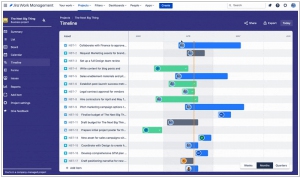
Atlassian has made an announcement regarding the introduction of a new edition of its project management tool, Jira, called Jira Work Management. The company has been actively expanding Jira's reach beyond its origins in software development teams. While Jira Service Management has successfully catered to IT teams, Jira Core has also made progress in this direction. However, Jira Work Management takes this a step further and is positioned to replace Jira Core. The objective behind Jira Work Management is to provide a version of Jira that empowers teams in various domains such as marketing, HR, finance, design, and more to efficiently manage their work. Moreover, if required, these teams can seamlessly connect their work with that of a company's development teams.
2020. Atlassian acquires asset management company Mindville

Atlassian has made an announcement regarding its recent acquisition of Mindville, an enterprise asset management provider focused on Jira. This acquisition marks Atlassian's entry into a new market segment, as it adds asset management tools to its existing suite of services. Mindville Insights, the flagship product of Mindville, enables tracking of assets across various departments such as IT, HR, sales, legal, and facilities within a company. While the platform is asset-agnostic, it is expected that many companies within Atlassian's user base will utilize it primarily for tracking IT assets such as servers and laptops. In addition to physical assets, the service also supports automatic importing of cloud-based servers from providers like AWS, Azure, and GCP. The Mindville team has developed connectors to integrate with popular services like ServiceNow and Snow Software. Notable customers of Mindville include NASA, Spotify, and Samsung, among others.
2020. GitHub is now free for all teams
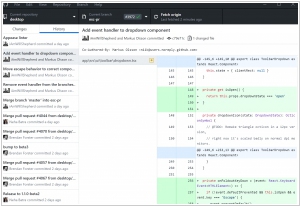
GitHub has recently announced that all of its core features are now available for free to all users. This includes unlimited private repositories with unlimited collaborators, catering to both individual users and teams engaged in commercial projects. Additionally, users can enjoy up to 2,000 minutes per month of free access to GitHub Actions, the platform's automation and CI/CD solution. While advanced features such as code owners and enterprise functionalities like SAML support still require a paid plan, the pricing structure has been revised. Teams can now upgrade to the Teams plan starting at $4 per month and user, compared to the previous cost of $9, while the Enterprise plan starts at $21 per month and user.
2018. Jira Cloud gets Trello-inspired redesign
Earlier this year, Atlassian introduced the latest iteration of its hosted project tracking tool, Jira Software. This release signifies a significant division between the hosted version of Jira, hosted on AWS, and the self-hosted server version, with Atlassian now focusing on distinct features for each. The new version of Jira boasts a fresh, Trello-inspired interface and introduces enhanced functionality that empowers teams with a more flexible workflow, reducing reliance on administrators and granting greater autonomy. One notable feature that Atlassian takes pride in is roadmaps, which enables teams to gain a comprehensive view of their projects. Similar to boards, modifying the roadmap is effortless as it simply involves dragging and reassigning larger work segments, referred to as "epics" in Agile terminology, to different dates.
2018. Atlassian launches Jira Ops for managing incidents
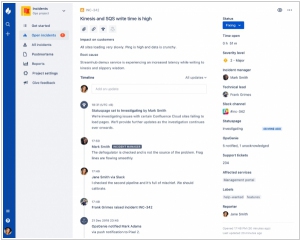
Atlassian has introduced a new edition of its flagship product, Jira, designed to enhance the efficiency and speed at which operations teams handle incidents. Jira Ops seamlessly integrates with various tools including OpsGenie, PagerDuty, xMatters, Statuspage, Slack, and others. While many teams already utilize these tools during service disruptions, Atlassian highlights the prevalent ad hoc approach employed by most companies in managing incidents. Jira Ops aims to serve as the cohesive element that ensures alignment and offers comprehensive visibility into ongoing incidents. With Jira Ops, when an incident occurs, users have a centralized location where they can access all relevant information. This includes details on who has been notified and alerted, the ability to notify additional individuals directly from the platform, and knowledge of the Slack channel dedicated to discussing the incident. Additionally, Atlassian has acquired OpsGenie for $295 million, further strengthening its incident management capabilities.
2018. GitHub business users now get access to public repos

GitHub, the code hosting service recently acquired by Microsoft, is introducing several new features for its business users, enhancing their ability to access public repositories on the platform. Previously, users on the hosted Business Cloud and self-hosted Enterprise environments lacked direct access to the vast array of public open-source repositories available on GitHub. However, with the latest update, this limitation is being addressed, enabling business users to extend their reach beyond their firewalls and actively engage and collaborate with the wider GitHub community. Additionally, GitHub now provides its business and enterprise users with a new unified search functionality, allowing them to explore both their internal repositories and open-source ones.
2018. Microsoft acquired GitHub

Microsoft has recently completed the acquisition of the widely used code sharing and collaboration platform, GitHub, for a whopping $7.5 billion. This cloud-based service enables companies of all sizes, including Microsoft, to collaboratively work on code. With 27 million software developers actively engaged in 80 million code repositories, GitHub has become an essential platform for various software development projects. Considering Microsoft's strategic focus on catering to software developers through cloud services, this acquisition aligns naturally with their vision, as spearheaded by CEO Satya Nadella. GitHub serves as a versatile tool utilized not only for coding Microsoft Windows applications but also for a wide range of projects, spanning from websites to iPhone apps. As a result of Microsoft's acquisition of GitHub, users can expect even deeper integration between Microsoft's developer tools and this platform, enabling a more seamless and enhanced experience.
2016. GitHub gets project management tool
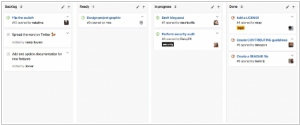
GitHub has introduced its "most significant update" to its Git-based code hosting service. This update expands GitHub's offerings beyond code hosting and includes basic project management features reminiscent of a Kanban board. While GitHub has always supported integrations with various project management tools, this update introduces a built-in tool that allows users to organize cards, such as pull requests, issues, and notes, into customizable columns like "in-progress," "done," or any other preferred labels. Similar to platforms like Trello, users can easily drag and drop cards between columns to reflect changes in project status. This enhancement enables GitHub to provide a more comprehensive solution for project management in addition to its existing code hosting capabilities.


